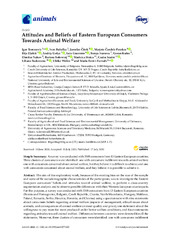Приказ основних података о документу
Attitudes and Beliefs of Eastern European Consumers Towards Animal Welfare
| dc.creator | Tomašević, Igor | |
| dc.creator | Bahelka, Ivan | |
| dc.creator | Citek, Jaroslav | |
| dc.creator | Čandek-Potokar, Marjeta | |
| dc.creator | Đekić, Ilija | |
| dc.creator | Getya, Andriy | |
| dc.creator | Guerrero, Luis | |
| dc.creator | Ivanova, Sonya | |
| dc.creator | Kusec, Goran | |
| dc.creator | Nakov, Dimitar | |
| dc.creator | Solowiej, Bartosz | |
| dc.creator | Stoica, Maricica | |
| dc.creator | Szabo, Csaba | |
| dc.creator | Tudoreanu, Liliana | |
| dc.creator | Weiler, Ulrike | |
| dc.creator | Font-i-Furnols, Maria | |
| dc.date.accessioned | 2020-12-17T22:48:47Z | |
| dc.date.available | 2020-12-17T22:48:47Z | |
| dc.date.issued | 2020 | |
| dc.identifier.issn | 2076-2615 | |
| dc.identifier.uri | http://aspace.agrif.bg.ac.rs/handle/123456789/5245 | |
| dc.description.abstract | Simple Summary A survey was conducted with 5508 consumers from 13 Eastern European countries. Three clusters of consumers were identified: one with consumers indifferent towards animal welfare; one with consumers concerned about animal welfare, but they believe it is difficult to achieve; and one with consumers concerned about animal welfare, and they believe it is possible to achieve it. The aim of this exploratory work, because of the existing bias on the size of the sample and some of the sociodemographic characteristics of the participants, was to investigate the Eastern European consumers' beliefs and attitudes toward animal welfare, to perform a cross-country segmentation analysis and to observe possible differences with their Western European counterparts. For this purpose, a survey was conducted with 5508 consumers from 13 Eastern European countries (Bosnia and Herzegovina, Bulgaria, Czech Republic, Croatia, North Macedonia, Hungary, Moldova, Poland, Romania, Serbia, Slovakia, Slovenia, and Ukraine) using a questionnaire with nine statements about consumers beliefs regarding animal welfare (aspects of management, ethical issues about animals, and consequences of animal welfare on meat quality and price), one statement about the willingness to pay more for meat produced under better welfare conditions, and four statements regarding attitudes toward animal welfare. Differences between countries were detected for all the statements. Moreover, three clusters of consumers were identified: one with consumers indifferent towards animal welfare; one with consumers concerned about animal welfare, but they believe it is difficult to achieve; and one with consumers concerned about animal welfare, and they believe it is possible to achieve it. | en |
| dc.publisher | MDPI, BASEL | |
| dc.relation | COST Action "Innovative approaches in pork production with entire males"-IPEMA [CA 15215] | |
| dc.relation | COST (European Cooperation in Science and Technology)European Cooperation in Science and Technology (COST) | |
| dc.rights | openAccess | |
| dc.rights.uri | https://creativecommons.org/licenses/by/4.0/ | |
| dc.source | Animals | |
| dc.subject | cluster | en |
| dc.subject | management | en |
| dc.subject | ethical | en |
| dc.subject | meat quality | en |
| dc.title | Attitudes and Beliefs of Eastern European Consumers Towards Animal Welfare | en |
| dc.type | article | |
| dc.rights.license | BY | |
| dc.citation.issue | 7 | |
| dc.citation.other | 10(7): - | |
| dc.citation.rank | aM21 | |
| dc.citation.volume | 10 | |
| dc.identifier.doi | 10.3390/ani10071220 | |
| dc.identifier.fulltext | http://aspace.agrif.bg.ac.rs/bitstream/id/3746/5242.pdf | |
| dc.identifier.scopus | 2-s2.0-85088588727 | |
| dc.identifier.pmid | 32709096 | |
| dc.identifier.wos | 000558175700001 | |
| dc.type.version | publishedVersion |


